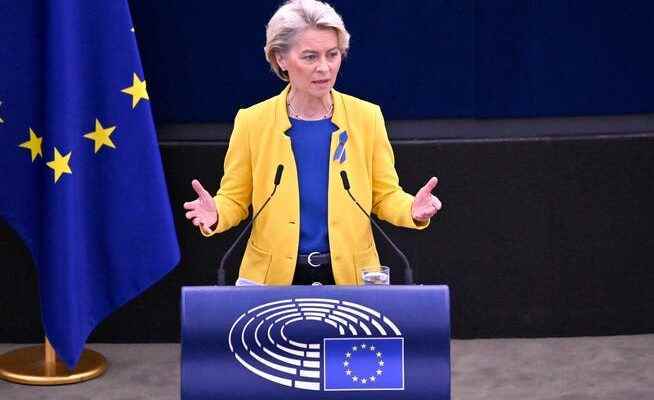Putin’s weapon is not yet blunt. The high energy prices hurt. They are an expression of a partly self-inflicted bottleneck that needs to be resolved. The very complicated redistribution mechanism that the EU is now proposing will do little or nothing.
EU Commission President Ursula von der Leyen calls on Europeans to show courage and solidarity in her speech on the state of the EU.
The President of the European Commission, Ursula von der Leyen, used big words in her State of the Union address: “This is not just a war between Russia and Ukraine,” she explained, “it is also a war against our energy , our economy, our values and our future.» To come to the end: “With courage and solidarity, Putin will lose and Europe will have the upper hand.”
That’s to be hoped for. But Putin’s energy weapon is not yet blunt. Electricity is scarce and has therefore become significantly more expensive. While a megawatt hour of electricity on the European spot market cost EUR 100 a year ago, it was over EUR 600 for two days at the end of August. It is currently just over EUR 400. In addition to courage and solidarity, it is above all a good dose of economic sense that helps.
A substitute for Russian natural gas, additional sources of electricity and incentives are needed to ensure that electricity consumption decreases in critical times and does not exceed supply. Hopefully most companies have secured themselves and are reacting to the changed situation. Many consumers still have to adapt. Taking money away from the energy companies in the style of Robin Hood and distributing it to the needy, as many politicians are now demanding and the EU Commission is also striving for, is much more complicated than it sounds and will not solve the problem.
It is understandable that politicians want to do something in such a crisis. Not only the German Chancellor Scholz likes to leave nobody alone. Some are calling for price caps, others for taxing “war profits”, and still others want to form purchasing cartels. They are happy to pass the ball on to Brussels, which actually makes sense in the case of the common European electricity market.
What is economically reasonable about the EU Commission’s reaction is that it did not respond to proposals that would cap prices directly on the electricity market or impose maximum prices for the purchase of natural gas. That would only have led to the supply becoming even more scarce and the demand even increasing. Power shortages and supply disruptions would become all the more likely.
The EU Commission has proposed a temporary “war tax”. It wants to collect the profits made this year by oil, gas and coal companies as well as by producers of gasoline, diesel and heating oil, which are more than a fifth above the average level of the past three years. Whether that will yield much is an open question.
It is more problematic that the EU states should collect the income from cheap producers of renewable electricity and nuclear energy and distribute it to those in need that exceed 180 euros per megawatt hour.
This is going to be a very complicated exercise. To ensure that transactions are not simply carried out outside the stock exchange, the tax must be levied wherever a transaction is concluded. It must not come into play if the electricity produced has long since been or is being sold at a lower price than has been secured. It is also completely unclear how the income can be distributed efficiently to which needy and to which companies. There is a great danger that a new bureaucratic monster will emerge that will bring little.
Europe will not win the energy war with it. It would help if nuclear power plants were not shut down and regulations that curbed supply were relaxed. The fact that the EU Commission wants to encourage saving is also reasonable. But economic incentives that reward savings and dampen peak demand help more than dirigiste savings targets. This is exactly what a flexible and liquid electricity market with agile market participants can achieve.
Prices will then fall again when there are signs that energy supply will increase and demand will decrease. Robin Hood can do little about it.
